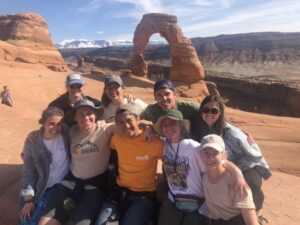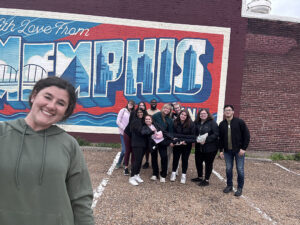The 2022-23 academic year is a year of celebrations for many Student Life offices and programs. We marked key anniversaries, highlighting UT’s long history of programs, resources, and support offered to students. For decades, the committed staff of Multicultural Student Life, the Jones Center for Leadership and Service, and the Office of Sorority and Fraternity Life have created environments where students become leaders.
150 Years of Sorority and Fraternity Life
In September 2022, the Office of Sorority and Fraternity Life (OSFL) celebrated 150 years since its inception on our campus. Since the first fraternity was chartered on campus in 1872, the university has hosted nearly 100 different local and national chapters of sororities and fraternities. Currently, there are 47 active chapters on our campus. More than 7,100 students, approximately 26% of the undergraduate population, are members of Greek-letter organizations and represent four governing councils: Interfraternity Council (IFC), Multicultural Greek Council (MGC), National Pan-Hellenic Council (NPHC), and Panhellenic Council.

There are 47 active chapters at UT, and approximately 26% of the student body, more than 7,100 students, are members.
“This community has continued to provide a space for students to see themselves reflected not just in activities on campus but also to provide space to network, learn, and grow in a safe environment, and to really figure out who they are as individuals,” said OSFL director John Keith. “So for 150 years this community has been cultivating leaders. For 150 years this community has been standing on the tenants of brotherhood, sisterhood, and siblinghood. For 150 years, this community has made a big place feel small.”
“On a campus where we have more than 30,000 students, they’re able to find their home,” echoed Hunter Carlheim, assistant director for OSFL. “They’re able to find their fit in a group of people that isn’t just twenty people, or ten people, or 150 people, or 400 people. They’re joining an entire community where they know that they are valued and have emotional support when they need it.”
Chapters can be seen around campus through their members, chapter banners on Pedestrian Walkway, the NPHC Monuments, Fraternity Park, and Sorority Village. Of the 47 chapters, UT has 20 active men’s fraternities, six culturally-based sororities and fraternities, eight historically Black sororities and fraternities, and 13 women’s sororities.
30 Years of VOLbreaks
Since 1993, hundreds of UT students participating in the Jones Center for Leadership and Service’s (JCLS) VOLbreaks have traveled around the country and the world to serve communities and gain new perspectives outside of UT. The alternative break program is an immersive community service experience that has expanded the thinking of students year after year when they think about and address serious social issues.
“The VOLbreaks program gives students the opportunity to engage in direct service in collaboration with communities around the world,” said Laura Solomon, associate director for JCLS.
“Students who participate spend their fall, winter, or spring breaks learning about critical challenges facing communities, interacting with local leaders, and performing short-term projects with community agencies. VOLbreaks (formerly Alternative Breaks) was around long before our center was created.”

Additionally, the Jones Center for Leadership and Service is celebrating the 10-year anniversary of the office. Creating a stand-alone office demonstrated the university’s commitment to leadership and service education at UT. Mandie Beeler, director of JCLS, shared that “each person has the capacity and responsibility to lead and serve in their respective communities. Leadership does not require a position or title to be influential, and we all have talents that can make us of service to others.”
The center was renamed the Jones Center for Leadership and Service in 2019 following a landmark gift of $5 million to enhance programs and initiatives offered to students.
